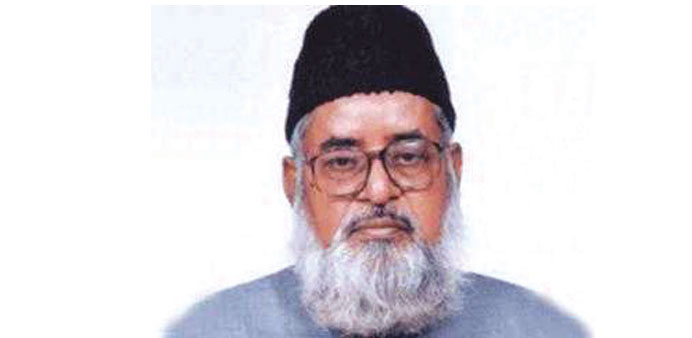By Mizan Rahma
The International Crimes Tribunal-2, known as War Crimes Tribunal, yesterday fixed April 7 for commencing the trial of detained Moulana Abdus Sobhan, a top leader of Jamaat-e-Islami, for war crimes.
After the conclusion of the opening statement by the prosecution, the three-member tribunal, headed by Justice Obaidul Hassan, set the date.
On December 31, 2013, the tribunal framed charges against Sobhan for his involvement in crimes against humanity, including genocide, during the 1971 Liberation War.
On September 19, 2013, after perusing the formal charges along with relevant statements and documents submitted by the prosecution, the tribunal took cognisance of charges against Sobhan as it found a strong prima facie case against the accused.
On September 20, 2012, Sobhan, the number three man in the Jamaat-e-Islami hierarchy, was held by the members of an army intelligence agency at the Bangabandhu Bridge toll plaza in Tangail district in connection with a case of violence. Later, the accused was handed over to the police.
The tribunal, upon a prosecution plea, had shown Sobhan arrested in connection with the case of the 1971 crimes against humanity.
According to the prosecution, it received allegations like genocide, rape, arson and looting perpetrated by Sobhan, the then leader of Pabna Peace Committee and Pabna district Jamaat ameer, in collaboration with the Pakistan forces, including Razakar, Al Badr and Al Shams vigilantes, during the Bangladesh’s Liberation War.
Sobhan had allegedly played a key role in organising Razakar, Al Badr and Al Shams, the auxiliary forces of the Pakistani junta, in Pabna district.
The two international crimes tribunals so far sentenced seven men to death and handed life imprisonment to three others after their convictions for crimes against humanity in the war of independence in 1971 when they collaborated with the Pakistan army.
All of the men were convicted in 2013, by the tribunals specially set up about four years earlier by the government through powers under the International Crimes (Tribunal) Act 1973.
The 10 men included two, now living outside - the Al-Badr Bahini leaders Chowdhury Mueenuddin and Ashrafuzzaman Khan - both sentenced to death for abducting and killing 18 intellectuals at the fag-end of the war.
The convicts include eight men who were at the time or later became leaders of Jamaat and its 1971 student wing, and two who became leaders of the country’s main opposition party, the Bangladesh
Nationalist Party.
Following an appeal in the appellate division, the life term of Jamaat leader Abdul Quader Molla was changed to a death sentence which was carried out in December 2013.
On March 25, 2010, the first ICT was constituted, 39 years after Bangladesh had emerged on the world map as a sovereign country, to bring to justice those who committed war crimes during the country’s independence.
On March 23, 2012, the second ICT was set up to speed up the disposal of the cases relating to 1971 crimes against
humanity cases.

